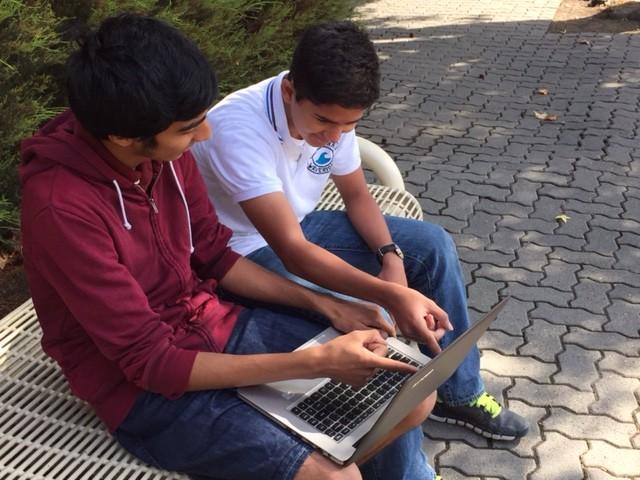Students begin the stock market challenge
DECA has begun its annual stock market challenge, an investment simulation game designed to help students explore the basics of stock trading.
Once students sign up for the challenge in small groups of two or three, they will receive a code that can be used to access the game. The stock market challenge simulates real investments; any publicly-traded stock can be bought and sold in various amounts. Students will be allowed to buy stocks from various industries, anything from telecommunications to biotechnology. The challenge will run until mid-December and is open to other high schools as well.
Juston Glass, the Director of Business & Entrepreneurship Program at the Upper School, believes that the stock market challenge is a great tool for students to learn more about business.
“I think its a low commitment, high reward activity. Here you can immerse yourself into economics and business,” Glass said. “The stock market can teach you a lot about not just investing but also how the economy is working and how the corporate world is functioning. You can spend 5 minutes in a week checking your portfolio or you can do 5 hours a day..”
Currently, over 90 students have signed up for the competition. Last year, there were 136 people involved in the challenge.
The team consisting of seniors Alex Tuharsky, Ashwath Thirumalai, and David Lin is currently ranked first within the school.
“We’re trying to determine the relative effects on the market of domestic policy,” Alex said in regards to his team’s investment strategy.
Many students believe that this simulation will help them learn more about the stock market in general. Rishabh Jain (12) believes that the challenge will help him learn more about healthy investments.
“I think the stock market challenge is a great way for students to learn more about investment techniques,” Rishabh said. “Because no real money is involved, people can make mistakes and try out new strategies without having to worry about losses.”
Many students are buying stock in Alibaba, a Chinese online retail company, which went public last Friday. Alibaba had the biggest initial public offering (IPO) in history, with a stock price closing over $90 the same day and is now valued more than social networking giant Facebook.
According to various experts in the field, buying stocks is tricky because there is no way to accurately predict the market. One specific stock might do well one day, but then sink the next.
In addition, Glass cautioned that a short time frame makes it tough to decide which stocks would be most profitable.
“The stock market game is not designed for learning long term investment…[because] over four months you can’t get a full taste of the full stock market world,” Glass said.
In spite of its short time frame, the stock market challenge presents students with an opportunity to explore stock investments in an educational and informative manner.

Vedant Thyagaraj is the Science & Technology Editor for Harker Aquila. He is currently a senior and has been on staff for the past three years. Vedant...


















![“[Building nerf blasters] became this outlet of creativity for me that hasn't been matched by anything else. The process [of] making a build complete to your desire is such a painstakingly difficult process, but I've had to learn from [the skills needed from] soldering to proper painting. There's so many different options for everything, if you think about it, it exists. The best part is [that] if it doesn't exist, you can build it yourself," Ishaan Parate said.](https://harkeraquila.com/wp-content/uploads/2022/08/DSC_8149-900x604.jpg)




![“When I came into high school, I was ready to be a follower. But DECA was a game changer for me. It helped me overcome my fear of public speaking, and it's played such a major role in who I've become today. To be able to successfully lead a chapter of 150 students, an officer team and be one of the upperclassmen I once really admired is something I'm [really] proud of,” Anvitha Tummala ('21) said.](https://harkeraquila.com/wp-content/uploads/2021/07/Screen-Shot-2021-07-25-at-9.50.05-AM-900x594.png)







![“I think getting up in the morning and having a sense of purpose [is exciting]. I think without a certain amount of drive, life is kind of obsolete and mundane, and I think having that every single day is what makes each day unique and kind of makes life exciting,” Neymika Jain (12) said.](https://harkeraquila.com/wp-content/uploads/2017/06/Screen-Shot-2017-06-03-at-4.54.16-PM.png)








![“My slogan is ‘slow feet, don’t eat, and I’m hungry.’ You need to run fast to get where you are–you aren't going to get those championships if you aren't fast,” Angel Cervantes (12) said. “I want to do well in school on my tests and in track and win championships for my team. I live by that, [and] I can do that anywhere: in the classroom or on the field.”](https://harkeraquila.com/wp-content/uploads/2018/06/DSC5146-900x601.jpg)
![“[Volleyball has] taught me how to fall correctly, and another thing it taught is that you don’t have to be the best at something to be good at it. If you just hit the ball in a smart way, then it still scores points and you’re good at it. You could be a background player and still make a much bigger impact on the team than you would think,” Anya Gert (’20) said.](https://harkeraquila.com/wp-content/uploads/2020/06/AnnaGert_JinTuan_HoHPhotoEdited-600x900.jpeg)

![“I'm not nearly there yet, but [my confidence has] definitely been getting better since I was pretty shy and timid coming into Harker my freshman year. I know that there's a lot of people that are really confident in what they do, and I really admire them. Everyone's so driven and that has really pushed me to kind of try to find my own place in high school and be more confident,” Alyssa Huang (’20) said.](https://harkeraquila.com/wp-content/uploads/2020/06/AlyssaHuang_EmilyChen_HoHPhoto-900x749.jpeg)



